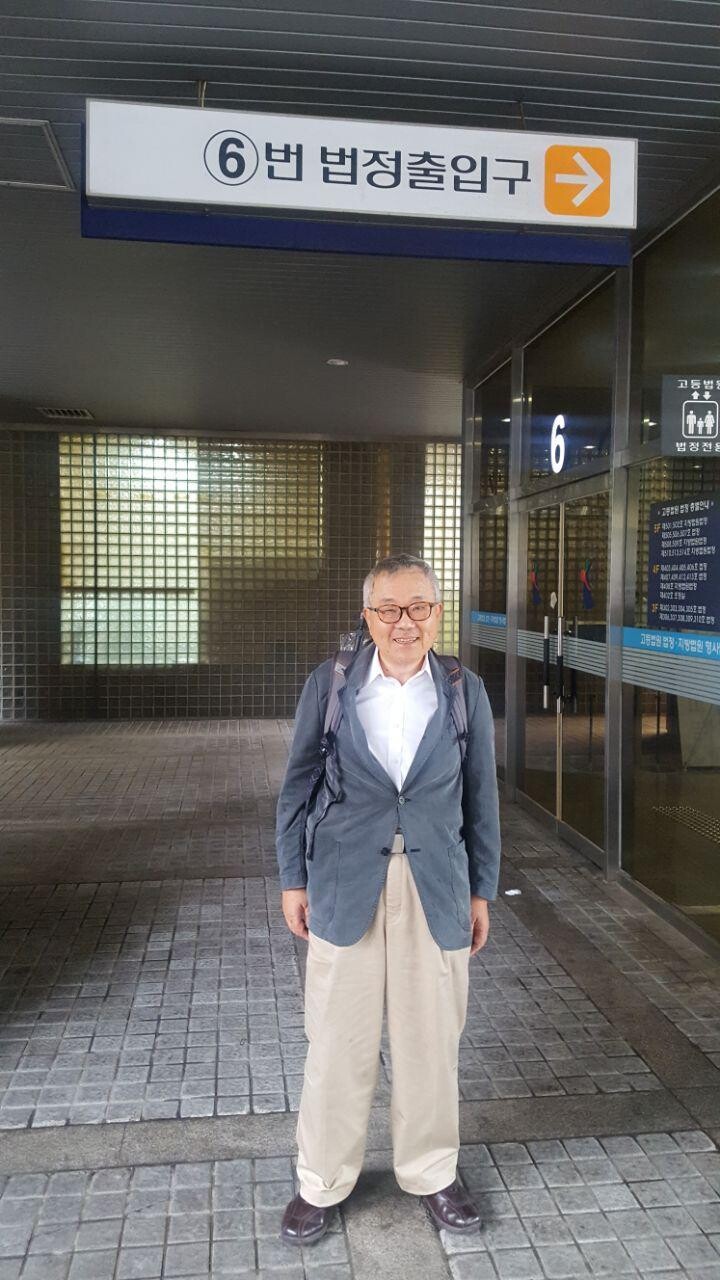hankyoreh
Links to other country sites 다른 나라 사이트 링크
Former journalist acquitted of charges of violating National Security Act after 38 years

“Each of the defendants are innocent,” said Hon. Hong Dong-gi, presiding judge of the 12th criminal division at the Seoul High Court, at 2 pm on June 26. As soon as Hong announced his sentence in Room No. 403 at the courthouse, quiet applause rippled through the gallery. The people who streamed out of the courtroom congratulated Ji Jeong-gwan, 78, who had been acquitted in the retrial.
“I’m happy to be able to tell my fellow reporters that democracy is being achieved in South Korea,” Ji said.
While working as the Tokyo foreign correspondent for a French wire service in 1980, Ji was convicted of violating South Korea’s National Security Act and sentenced to seven years in prison. In Apr. 1979, at the tail end of Park Chung-hee’s military dictatorship, the police’s security headquarters announced that they had apprehended ten spies who had been attempting to rebuild the Revolutionary Unification Party under orders from North Korea.
Along with Ji, the people who were identified as spies in this affair included Lim Dong-gyu, head of general affairs at the Korea University Institute for Research on Labor and Employment; Park Hyeon-chae, a lecturer at Chungnam National University and Kyung Hee University and the author of a book called Theory of the National Economy; and Yang Jeong-gyu, managing director of a research society into modernizing South Korean agriculture.
They were put on trial for violating the National Security Act, accused of having been recruited by North Korean agents in Japan to ferret out classified information and praise North Korea. The accused were found guilty in the trial and sentenced to various prison terms, including life imprisonment.
But the only petitioner for a retrial who was around to hear the “good news” during the trial was Ji, who came over from Japan. In 2013, Ji and four other members of the alleged spy ring who had been sentenced to prison for attempting to rebuild the Revolutionary Unification Party appealed for a retrial. Of these five, Park Hyeon-chae and Kim Jae-uk had already passed away long ago. It took four years just for the court to decide to reopen the case, during which time Yang Jeong-gyu died, in 2014. Lim Dong-gyu was diagnosed with Parkinson’s Disease and is hospitalized in a nursing home.
“The defendants were detained by the investigators without a warrant, and they confessed during this state of illegal detention, before the arrest warrant was issued. In light of the psychological pressure resulting from their illegal detention and the coercive situation that continued during the prosecutors’ investigation, the confessions obtained during the prosecutors’ interrogation are not admissible as evidence,” the judge wrote in his verdict.
Of course, this acquittal does not bring the legal process to an end. Even though Ji and the rest have waited 38 years since the Supreme Court confirmed their life sentences and five years since they requested a retrial, their acquittal in the retrial will only be confirmed if the prosecutors’ do not appeal the case during the next seven days.
By Kim Min-kyoung, staff reporter
Please direct comments or questions to [english@hani.co.kr]

Editorial・opinion
![[Column] Season 2 of special prosecutor probe may be coming to Korea soon [Column] Season 2 of special prosecutor probe may be coming to Korea soon](https://flexible.img.hani.co.kr/flexible/normal/500/300/imgdb/original/2024/0426/3317141030699447.jpg) [Column] Season 2 of special prosecutor probe may be coming to Korea soon
[Column] Season 2 of special prosecutor probe may be coming to Korea soon![[Column] Park Geun-hye déjà vu in Yoon Suk-yeol [Column] Park Geun-hye déjà vu in Yoon Suk-yeol](https://flexible.img.hani.co.kr/flexible/normal/500/300/imgdb/original/2024/0424/651713945113788.jpg) [Column] Park Geun-hye déjà vu in Yoon Suk-yeol
[Column] Park Geun-hye déjà vu in Yoon Suk-yeol- [Editorial] New weight of N. Korea’s nuclear threats makes dialogue all the more urgent
- [Guest essay] The real reason Korea’s new right wants to dub Rhee a founding father
- [Column] ‘Choson’: Is it time we start referring to N. Korea in its own terms?
- [Editorial] Japan’s rewriting of history with Korea has gone too far
- [Column] The president’s questionable capacity for dialogue
- [Column] Are chaebol firms just pizza pies for families to divvy up as they please?
- [Column] Has Korea, too, crossed the Rubicon on China?
- [Correspondent’s column] In Japan’s alliance with US, echoes of its past alliances with UK
Most viewed articles
- 1Samsung subcontractor worker commits suicide from work stress
- 2‘We must say no’: Seoul defense chief on Korean, USFK involvement in hypothetical Taiwan crisis
- 3[Editorial] Korea’s surprise Q1 growth requires objective assessment, not blind fanfare
- 4Division commander ordered troops to enter raging flood waters before Marine died, survivor says
- 5Is Japan about to snatch control of Line messenger from Korea’s Naver?
- 6No good, very bad game for Korea puts it out of Olympics for first time since 1988
- 7US overtakes China as Korea’s top export market, prompting trade sanction jitters
- 8N. Korean delegation’s trip to Iran shows how Pyongyang is leveraging ties with Moscow
- 9Korea’s 1.3% growth in Q1 signals ‘textbook’ return to growth, says government
- 10[Column] Season 2 of special prosecutor probe may be coming to Korea soon